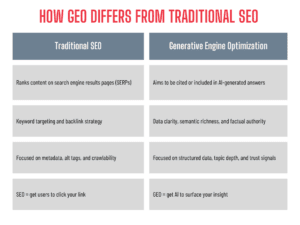
Your Guide to Generative Engine Optimization

As artificial intelligence reshapes the way people search for and interact with information, digital marketing is undergoing a huge transformation. Gone are the days when ranking on Google’s front page was the pinnacle of SEO success. Today, AI-powered systems like ChatGPT, Google Gemini, and Perplexity are becoming the first stop for everything from casual questions to business research. These generative engines don’t just retrieve links—they collect knowledge and deliver complete, conversational answers.
This shift has led us to a new era of SEO: Generative Engine Optimization (GEO).
GEO is not simply a new take on SEO. It’s a rethinking of how content is discovered and surfaced in a world where intelligent agents act as the gatekeepers to information. Instead of focusing solely on search engine result pages, marketers and content creators must now ensure their content can be understood, trusted, and referenced by AI systems that generate responses in real time.
With over 20 years of experience, JLB Works is your agency specializing in AI-Driven SEO services. Contact us today, and let’s get started on your project!
What is Generative Engine Optimization?
Generative Engine Optimization refers to the process of creating and structuring content so that it can be effectively used by AI-powered search tools and conversational agents. For example, Google’s AI Overviews (AIO) is a noticeable feature in search results, changing the way we see information.
Unlike traditional search engines that serve up a list of links based on keyword matching and ranking signals, generative engines analyze massive amounts of information to construct original responses tailored to a user’s query. GEO is the art and science of ensuring that your content becomes part of those answers.
This means that instead of asking how to get your link to appear higher on Google, the modern marketer needs to ask: how do I get my insights into the answers that AI generates?
How GEO Differs from Traditional SEO
While both traditional SEO and GEO share a focus on visibility and discoverability, the mechanisms behind them are fundamentally different. Traditional SEO relies heavily on keyword targeting, backlinks, technical performance, and metadata optimization. It’s largely about helping search engines index and rank your site effectively.
GEO, on the other hand, operates on a deeper level of content understanding. AI systems don’t just crawl and rank—they interpret. They’re looking for well-structured, semantically rich content that provides clear, factual, and authoritative information. The goal is no longer just to rank; it’s to be cited, paraphrased, or directly quoted by generative engines in their outputs.
This requires an entirely different mindset—one where clarity, depth, and factual integrity are prioritized over keyword density or backlink counts.

The Role of AI in Modern Search
Artificial intelligence has shifted user expectations and behaviors. People no longer just search—they ask. Whether it’s for product recommendations, explanations of complex topics, or even creative inspiration, users now expect immediate, accurate answers in a natural language format. AI systems fulfill that expectation by synthesizing responses from a wide range of content sources—blogs, databases, forums, and academic materials.
This evolution places a new demand on content creators. AI needs to find your content, interpret it correctly, and determine that it’s reliable enough to include in an answer. Unlike a human who might browse multiple links, the AI is trying to condense thousands of sources into a single, coherent response. To be part of that response, your content needs to be both accessible and understandable to machines.
Key Components of GEO
To position your content for generative engines, focus on the 5 key pillars of GEO:
1. Structured, Semantic Content
Use clear headings, schema markup, and logical content organization. AI needs to easily parse relationships between concepts.
2. Depth Over Breadth
GEO rewards expert-level content. Surface-level blogs won’t make the cut. Your content must demonstrate comprehensive domain knowledge.
3. Trust & Source Attribution
Use cited data, link to credible references, and display credentials. AI systems prioritize trustworthy sources.
4. Consistent Brand Voice & Context
AI looks for signals of authority and clarity. Maintain a consistent tone, reinforce your niche, and clearly state who you are and what you do.
5. Clear Answers and Summaries
Include direct answers in your content—FAQs, definitions, stats, and “TL;DR” sections that AI can lift and reuse.
Benefits of AI-Driven SEO Strategies
Optimizing for AI-driven search isn’t just about future-proofing your brand—it brings real benefits even now. By aligning your content with the needs of generative systems, you position yourself to be part of the answers users receive directly, without needing to click through a search engine result page. This type of visibility builds brand authority and trust.
Additionally, content that is clear, structured, and genuinely helpful tends to perform better with human audiences as well. GEO encourages high-quality content production that resonates across platforms, increasing the likelihood of citations, shares, and repeat engagement. As users begin to rely more heavily on AI tools for information, being part of the conversation—quite literally—will be key to maintaining relevance.
Generative search is becoming the norm. Help ensure that you don’t fall behind by hiring an experienced GEO Agency like JLB Works.
Implementing GEO in Your Content Strategy
Shifting toward a GEO strategy requires a conscious, deliberate approach to content creation. The first step is auditing your existing material. Ask whether your current content is easily understandable, well-structured, and clearly sourced. If not, it may need refinement.
From there, start producing content that answers real questions. Think in terms of concepts and context rather than isolated keywords. Provide comprehensive, nuanced information that reflects your expertise, and present it in a way that both humans and AI can digest.
Updating content regularly is also essential. AI systems are increasingly incorporating real-time information, so your content must remain current to stay relevant. Don’t hesitate to revise older posts with new data, improved explanations, or updated citations to ensure they continue to serve as reliable sources.
Future Trends in Generative Engine Optimization
Looking ahead, GEO will continue to evolve alongside the capabilities of AI. We can expect to see the rise of new AI-native search engines, more advanced content analysis systems, and tools that track AI citations in real time. Content licensing and attribution models may also change, potentially offering new revenue streams or legal considerations for those whose work powers AI responses.
Additionally, voice search and conversational interfaces will grow in popularity, meaning content will need to be even more natural, clear, and context-aware. Brands that position themselves as trusted sources today will have a competitive advantage as these technologies mature.
Getting Started with GEO with an AI-SEO Agency
Not every agency is equipped to navigate the shift from traditional SEO to GEO. When selecting a partner, it’s critical to find one that understands how generative engines work and how content is sourced by AI. Look for an agency that values clarity, credibility, and structure over clickbait or keyword stuffing.
The right partner should be able to help you create content that goes beyond rankings. They should be able to strategize around citation potential, schema integration, and brand positioning in AI-generated results. If an agency is still reporting only on SERP positions, it’s worth asking whether they’re tracking your visibility in AI answers as well.
We know—the transition to generative engine optimization may feel daunting, but it begins with a simple mindset shift. Stop thinking only about rankings, and start thinking about relevance, clarity, and authority. Your content should not just be found—it should be used. The sooner your organization embraces that evolution, the more visible, credible, and future-ready it will become.
Call us at 629-299-2226 or visit us online to schedule your consultation today. Let JLB help your business grow in AI results!


Have A Project For Us?
Website design services & digital marketing tailored for user experience and
attracting the right traffic for you with support-that-matters!



